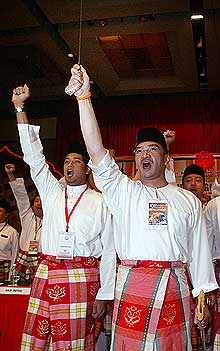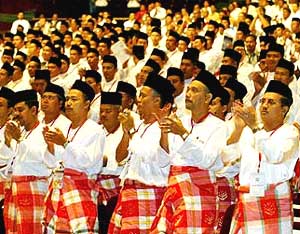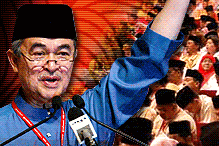Umno Perlis delegate Hashim Suboh was quoted in a New Straits Times report as saying at the end of the debate on economy and education issues that "Datuk Hisham (Umno Youth chief Hishammuddin Hussein) has unsheathed his keris , waved his keris , kissed his keris . We want to ask Datuk Hisham when is he going to use it?"
The Perlis delegate made the remark while saying "force must be used against those who refused to abide by the social contract" in relation to Hishammuddin's alleged weakness in dealing with demands from the Chinese schools. - malaysiakini report, Nov18, 2006.
That delegate's remark is an embarrassment to the peace-loving people of Perlis, let alone represents what the Malay is, intellectually. The Malays of Perlis elect their representative not to misrepresent them with a false image of myopia and paranoia, or amuk and latah. It shows how ill-prepared one is in dealing with sensitive issues. It is telling the people of Perlis that they need better leaders with better command of the vocabulary of peace and better understanding of what 'social contract' means. A close reading of the Enlightenment thinker Jean Jacques Rousseau would help the delegate write sensible speeches.
This bring us to the following questions:
What is a Malay? What is a Malaysian? What is a nationalist? What is a 'nation'? How are we becoming "re-tribalised" in this world of increasing restlessness over a range of issues that are not being resolved by the current regime. These are burning questions as we become more mature in discussing race relations in Malaysia almost 40 years after the May 13, 1969 incident.
Ernest Renan, Anthony Smith, Benedict Anderson, Harry Benda, and John Funston major scholars of nationalism -- would agree that Umno does not have an ideology except to sustain its elusive political superiority via the production of post-industrial materials and human beings.
Elusive word
 Even the word "National Front" (Barisan Nasional) is elusive. It is surviving as long as means to cling on to power by all means necessary becomes more efficient and sophisticated. Its survival lies in the way people are divided, conquered, and mutated into 'post-industrial tribes'; market-segmented-differentiatedly-sophisticated enclaves that are produced out of the need for the free market economy to transform Malays and Malaysians into consumers of useless goods and ideology.
Even the word "National Front" (Barisan Nasional) is elusive. It is surviving as long as means to cling on to power by all means necessary becomes more efficient and sophisticated. Its survival lies in the way people are divided, conquered, and mutated into 'post-industrial tribes'; market-segmented-differentiatedly-sophisticated enclaves that are produced out of the need for the free market economy to transform Malays and Malaysians into consumers of useless goods and ideology.
Post-industrial tribalism is a natural social reproduction of the power of the media to shape consciousness, and to create newer forms of consumerist human beings. Nationalism, including Malay nationalism of the Mahathirst era, is an artificial construct that needs the power of "othering" and "production of enemies" and "boogeymen and boogeywomen" for ideological sustainability.
But what is "nationalism" and does "Malay nationalism" actually exist in this century? Does the idea of 'natio' or "nation" or "a people" survives merely on linguistic, territorial, religious homogeneity when these are also subject to the sociological interrogations of subjectivity and relativity?
Nationalism is a psychological and cultural construct useful and effective when deployed under certain economic conditions. It is now ineffective as a tool of mass mobilisation when nations have gained "independence" from the colonisers and when the "enemy" is no longer visible. All that exist in this post-industrial, globalised, borderless, and mediated age of cybernetic capitalism is the idea of "post-industrial tribes" that live and thrive on chaos and complexity and on materials and goods produced by local and international capitalists.
Revise the old formula
 We are in the 21st. century. About three years from now, we will arrive at the year 2010. The non-Malays and non-bumiputeras have come a long way into being accepted as full-fledged Malaysians, by virtue of the ethics, rights and responsibilities of citizenship. They ought to be given equal opportunity in the name of social justice, racial tolerance and the alleviation of poverty.
We are in the 21st. century. About three years from now, we will arrive at the year 2010. The non-Malays and non-bumiputeras have come a long way into being accepted as full-fledged Malaysians, by virtue of the ethics, rights and responsibilities of citizenship. They ought to be given equal opportunity in the name of social justice, racial tolerance and the alleviation of poverty.
Bright and hard-working Malaysians regardless of racial origin who now call themselves Malaysians must be given all the opportunities that have been given to Malays since 40 years back.
Islam and other religions require this form of social justice to be applied to the lives of human beings. Islam does not discriminate one on the basis of race, ethnicity, color, creed nor national origin. It is race-based politics, borne out of the elusiveness of nationalism, that creates post-industrial tribalistic leaders; leaders that will design post-industrial tribalistic policies. It is the philosophy of greed, facilitated by free enterprise runamuck that will evolvingly force leaders of each race to threaten each other over the control of the economic pie.
The claim of 'civilisational Islam' or "Islam Hadhari" must be backed with a philosophy of development that restructure society no longer on the basis of newer forms of post-industrial tribalism that accords the political elites with the best opportunity to amass more wealth, but to redesign the economic system based on an efficient and sound socialistic economic system. It might even require political will to curb human enthusiasm of acquiring more and more of the things they do not need. In short, it should curb temptations to out-consume each other in the name of greed.
 To be civilised means to wake up to the possibilities of humanism and not plunge into a world of more sophisticated racism. The universal principle of humanism requires the privileged few to re-examine the policies of national development that prioritise the creation of more real estate projects than the construction of programmes that meet basic needs of all races and classes of peoples. To civilise a nation means to de-tribalise the citizens into a polity that will learn to share the wealth of this nation by accepting this land as the "earth of mankind" (bumi manusia) rather that a land belonging to this or that race.
To be civilised means to wake up to the possibilities of humanism and not plunge into a world of more sophisticated racism. The universal principle of humanism requires the privileged few to re-examine the policies of national development that prioritise the creation of more real estate projects than the construction of programmes that meet basic needs of all races and classes of peoples. To civilise a nation means to de-tribalise the citizens into a polity that will learn to share the wealth of this nation by accepting this land as the "earth of mankind" (bumi manusia) rather that a land belonging to this or that race.
In a multi-racial, multi-religious, country such as Malaysia, nationalism is a complex yet withering concept. In a globalised world of globally- and government-linked companies this concept of "fatherland" or "motherland" is a powerful weapon of the wealthy to mount arguments that hide the real intention of empire-building. The lifestyle of the country's rich and famous require nationalist sentiments to be played up so that the more the rights are "protected" the more the political-economically rich few will have their sustained control over the people, territories, natural resources and information.
This, I think is the picture of post-industrial tribalism we are seeing as a mutation of the development, appropriation and imitation of the Malay feudalistic mentality. The clear and present danger in our post-industrial tribalistic world lies in old formula we are wrongly using.
The essential question now is as a 'Malaysian nation'/Bangsa Malaysia haven't we agreed upon a common history and a common destiny?

